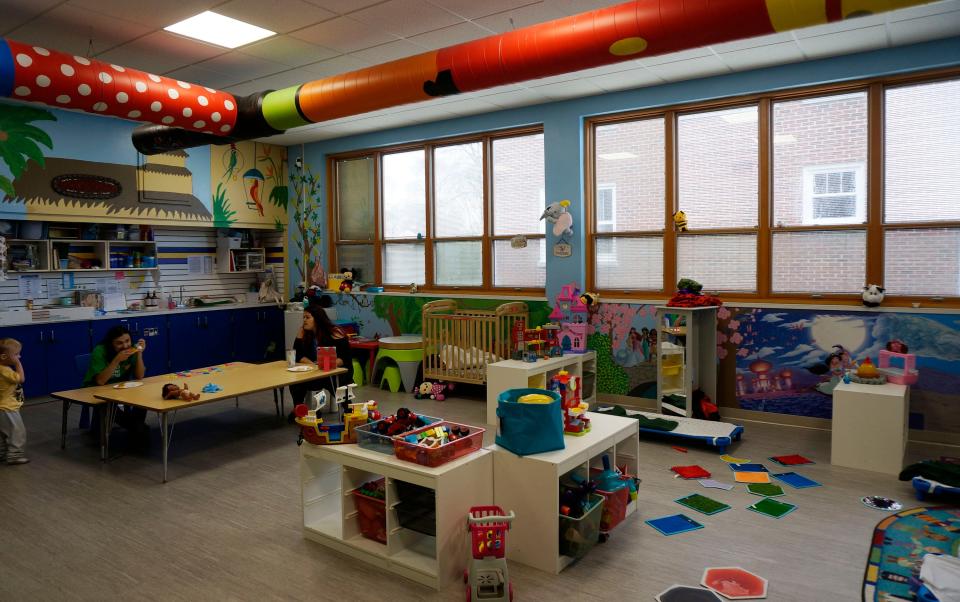How are child care challenges affecting Sheboygan's workplaces? A new local survey gives insight.

SHEBOYGAN – An array of findings emerged from a recent Sheboygan community survey focusing on child care issues.
The Sheboygan County Child Care Impact Survey, conducted by United Way’s Sheboygan County Community Partnership for Children and Leede Research, had significant findings about the child care challenges families face in the area from more than 400 survey respondents.
Responses indicated a need for more affordable and qualified providers, showed a picture of how child care greatly affects people's ability to participate in the workforce and an opportunity for employers to be more involved in the issue.
The survey — as well as implementing developmental screenings for children and helping unregulated in-home child care providers achieve certification — was part of a $75,000 Dream Up! Child Care Supply-Building grant awarded to the county last year to address ongoing child care issues.
Survey results were shared at a community discussion earlier this week.
What were some key takeaways from the survey?
Some key takeaways from the survey highlight challenges people utilizing child care have faced in the workplace in the past year.
64% of respondents said they used PTO, like vacation or sick days, to address child care needs.
48% of respondents said they missed work because of child care issues.
40% of respondents said they turned down additional hours or options at work because of child care needs.
36% of respondents said they have covered for co-workers with child care issues and needs.
What is the primary source of child care in Sheboygan County?

Family is the primary source for child care in the county, with a combined 44% of respondents saying they either relied on a spouse, significant other or family member.
State-regulated facilities or child care centers are also significantly utilized, with 25% of respondents saying it was their primary source of child care.
Others’ primary source of child care included before-school and after-school programs and services, non-regulated in-home providers, preschools or friends.
Ryan Wilinski, director of Community Partnership for Children, said the community discussion reinforced the idea people want different child care options.
“There's no one simple one-size-fits-all solution,” Wilinski said. “There's a lot of excitement behind employer-sponsored or -supported child care, but we've had one or two individuals at the event who brought up, ‘I don't want my child care through my employer. I'm not comfortable with that.’ They would rather see a government-sponsored solution or private solution.”
What are the biggest issues concerning child care and local families?

Among the top 10 themes of child care concerns, cost, availability and quality of child care emerged as the greatest challenges among survey respondents.
When asked how satisfied respondents were with their child care on a scale from 1 to 10, the bottom 32% of them were not satisfied.
To address the lack of available providers, child care referral agency Family Connections rolled out a recruitment specialist program to assist in the licensing process, supported by American Rescue Plan Act funds. The organization works with certified and licensed family providers and group expansions, offering grants from $5,000 to $20,000 to help them start operating their businesses.
Three group expansions and three certified and licensed family startups have been completed, according to Family Connections Executive Director Colleen Steinbruecker. Seven family startups, four group expansions and one group startup are pending. Additionally, the organization created funding for 90 child care slots. Roughly 120 are pending.
Family Connections is also working to retain child care providers by offering them retention bonuses, as they often face short staffing, burnout, low wages underappreciation.
What's happening Memorial Day weekend: Brat fries, parades and live music — here are 7 Sheboygan-area Memorial Day events to know about
Do employers have a role to play in child care?
The survey presentation and discussion showed there is a growing opportunity for employers to engage in local child care issues.
There was “quite a bit of sentiment around employers not truly understanding the issue, or feeling it was as important as it needs to be when they're struggling with that issue of child care, and they just feel that their employer doesn't care, doesn't understand what they're going through,” Wilinski said about community members at the survey results meeting.

In part of the survey, respondents agreed most with statements that an employer with on-site child care would be a more attractive place to work and a job with some type of support for child care would be more attractive to them than others.
This could look like flexible scheduling, child care stipends or PTO policies.
At 53%, child care was the largest reason survey respondents said they weren’t working.
“I have heard countless stories, varying from employers to people, looking to move to the area that want to move here,” Wilinski said. “A lot of times even have a job offer lined up and aren't able to accept it because they realize that if they move here to take this job, and they're relocating their family, they may not know people here, they don't have that family piece to lean on. And if they can't get into a child care program for eight months, they're just not able to work.”
But employers may face challenges with providing child care, too, Wilinski said. If they want to open an onsite child care center, they could face large costs with getting a new facility — building or developing an existing one — to comply with child care licensing requirements.
The CPC team could use the survey results to find solutions among employers, from updating policies to make them more family friendly or assisting aspirations for onsite child care services, Wilinski said.
What challenges do child care providers face?
Another piece that emerged from the survey results meeting was the need to better understand what child care actually looks like.
Steinbruecker said there are sentiments that child care is a babysitting service.
“They're not really recognized for the work that they do,” she said.
Child care providers are integral in preparing children to enter adulthood, becoming productive members of society, Wilinski said.
Other long-term benefits of developmentally appropriate and structured child care, he said, include reduced delinquency rates, more people in the workforce and contributions to a community, like a larger tax base.
“That all starts with that early childhood piece,” Wilinski said.
New Executive Director at Habitat: Habitat for Humanity Lakeside appoints new executive director, a familiar nonprofit leader
Does child care affect people without kids?
Child care issues reach beyond families with children, too, Wilinski said.
36% of survey respondents said they had to cover for someone at work who had child care issues, and 51% said they turned down social obligations or opportunities because there wasn’t available child care.
“There's a huge ripple effect that it's not just families that are feeling issues there," he said.
What will happen with the survey results?
For such a complex issue, the CPC team wants to continue the conversation about child care challenges.
It will work to engage new partners and distill this information to specific target groups to find more solutions to the child care dilemma in the county. The Healthy Sheboygan County and Community Health Improvement Plan Child Care Action Team is also a group spreading awareness. Residents are also encouraged to reach out to representatives, Wilinski said.
Have a story tip? Contact Alex Garner at 224-374-2332 or [email protected]. Follow her on X (formerly Twitter) at @alexx_garner.
This article originally appeared on Sheboygan Press: Sheboygan Child Care Impact Survey results show impact on workplace
